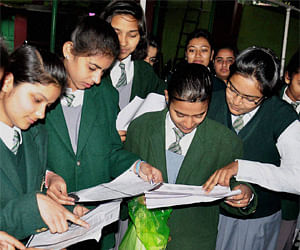
Union Ministry of Human Resource has asked state and central school boards to consider introducing open-book tests in secondary and senior secondary-level examinations. The aim of the ministry is to have significant assessment reforms in the field of school education.
According to a report by Indian Express (http://goo.gl/9OXO7S), Open-book assessment allows students to refer to their notes or textbooks while answering questions. The focus is not on memorising information, but on applying that information. Examinees are expected to not merely reproduce textbook material, but to interpret it in the context of specific questions and scenarios.
In a meeting of 42 education boards held on October 28 last year, HRD Ministry set up an eight-member committee to work on "common design of questions papers". The inclusion of open text-based assessment (or OTBA) in board examinations is one of the key action points of the committee.
The committee has members from different boards, which has been asked to submit its report by January 29.
Taking suggestion of Sanjay Patwa, a representative of the Madhya Pradesh Board, that it could help reduce the influence of coaching institutes, the school education secretary asked boards to "consider integrating OTBA as a section of their question papers" for classes IX to XII.
As per the minutes of the meeting, Dr Khuntia stated that, the conceptual clarity should be tested in the exams rather than rote memory of the students. The purpose of education is to make students more conscious and aware of surroundings as well as be able to lead their life in a better way. He said that Open Book based examination is a good point for consideration as the testing will not be on memory but on comprehension and understanding. In such a format, rote learning will not work as the pattern of questions will focus on thinking.
OTBA was currently followed by the board for classes IX and XI in CBSE schools, students in classes IX and XI are provided the text material months ahead of their final examination. They are allowed to refer to this at the time of taking the test.
Referring to the tendency of some boards to award progressively higher academic grades, the school education secretary also stressed on the importance of adopting a consistent evaluation process across state boards and balancing question papers with easy, moderate and difficult questions. (30 per cent easy + 40 per cent moderate + 30 per cent difficult).
"The question paper should be such that it can help distinguish between highly meritorious students and less meritorious students. Easy question papers make it difficult to distinguish on merit as a large number of students score high marks" Khuntia stated in the meeting.
The government also suggested that the boards should avoid giving grace marks to students, and they should prepare a policy for awarding grace marks. The HRD Ministry has set up four committees of state board officials which will have to submit reports on adopting common curriculum, common question paper design, teacher capacity building and sharing information between boards by the end of this month.
According to a report by Indian Express (http://goo.gl/9OXO7S), Open-book assessment allows students to refer to their notes or textbooks while answering questions. The focus is not on memorising information, but on applying that information. Examinees are expected to not merely reproduce textbook material, but to interpret it in the context of specific questions and scenarios.
In a meeting of 42 education boards held on October 28 last year, HRD Ministry set up an eight-member committee to work on "common design of questions papers". The inclusion of open text-based assessment (or OTBA) in board examinations is one of the key action points of the committee.
The committee has members from different boards, which has been asked to submit its report by January 29.
Taking suggestion of Sanjay Patwa, a representative of the Madhya Pradesh Board, that it could help reduce the influence of coaching institutes, the school education secretary asked boards to "consider integrating OTBA as a section of their question papers" for classes IX to XII.
As per the minutes of the meeting, Dr Khuntia stated that, the conceptual clarity should be tested in the exams rather than rote memory of the students. The purpose of education is to make students more conscious and aware of surroundings as well as be able to lead their life in a better way. He said that Open Book based examination is a good point for consideration as the testing will not be on memory but on comprehension and understanding. In such a format, rote learning will not work as the pattern of questions will focus on thinking.
OTBA was currently followed by the board for classes IX and XI in CBSE schools, students in classes IX and XI are provided the text material months ahead of their final examination. They are allowed to refer to this at the time of taking the test.
Referring to the tendency of some boards to award progressively higher academic grades, the school education secretary also stressed on the importance of adopting a consistent evaluation process across state boards and balancing question papers with easy, moderate and difficult questions. (30 per cent easy + 40 per cent moderate + 30 per cent difficult).
"The question paper should be such that it can help distinguish between highly meritorious students and less meritorious students. Easy question papers make it difficult to distinguish on merit as a large number of students score high marks" Khuntia stated in the meeting.
The government also suggested that the boards should avoid giving grace marks to students, and they should prepare a policy for awarding grace marks. The HRD Ministry has set up four committees of state board officials which will have to submit reports on adopting common curriculum, common question paper design, teacher capacity building and sharing information between boards by the end of this month.








